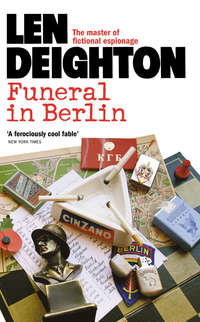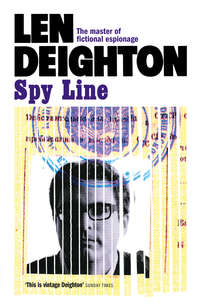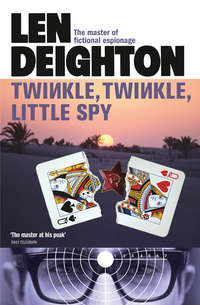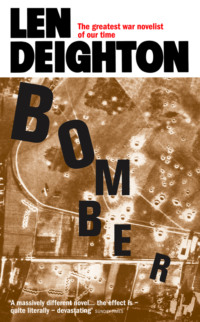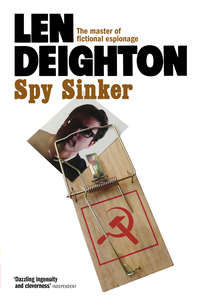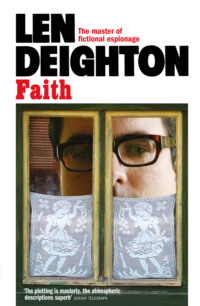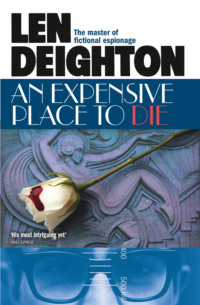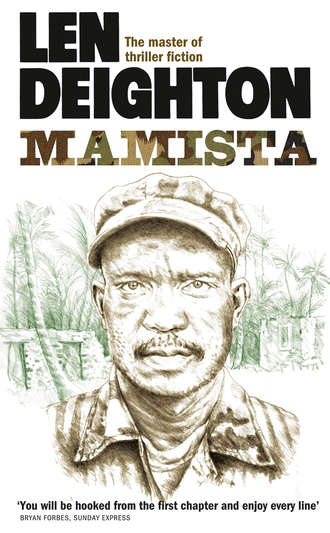
Полная версия
MAMista

Len Deighton
MAMista

Copyright
This novel is entirely a work of fiction.
The names, characters and incidents portrayed in it are the work of the author’s imagination. Any resemblance to actual persons, living or dead, events or localities is entirely coincidental.
Published by HarperCollinsPublishers Ltd 1 London Bridge Street London SE1 9GF
www.harpercollins.co.uk
This paperback edition 2011
First published in Great Britain by Century in 1991
Copyright © Len Deighton 1991
Introduction copyright © Pluriform Publishing Company BV 2011
Cover designer’s note © Arnold Schwartzman 2011
Len Deighton asserts the moral right to be identified as the author of this work
A catalogue record for this book is available from the British Library
MAMISTA. Copyright © Len Deighton 1991. All rights reserved under International and Pan-American Copyright Conventions. By payment of the required fees, you have been granted the nonexclusive, nontransferable right to access and read the text of this e-book on-screen. No part of this text may be reproduced, transmitted, downloaded, decompiled, reverse-engineered, or stored in or introduced into any information storage and retrieval system, in any form or by any means, whether electronic or mechanical, now known or hereinafter invented, without the express written permission of HarperCollins e-books.
Source ISBN: 9780007385850
EPub Edition © JULY 2011 ISBN: 9780007450855
Version: 2017-08-10
Contents
Cover
Title Page
Copyright
Cover designer’s note
Introduction
1
The smell of the rain forest came on the offshore…
2
The man’s name was buried in a Spanish Guiana file…
3
Ralph Lucas was forty-five years old and every year of…
4
Ralph Lucas did not much like flying and he detested…
5
From the top floor of the American embassy building on…
6
Despite his US passport, Angel Paz had not been permitted…
7
The glass doors of Tepilo’s police headquarters were tinted bronze.
8
‘Speedy Gonzales’ – Thorburn’s twin-engined Beech – might have been…
9
‘It’s not unlike Florida.’ When Jack Charrington closed his desk,…
10
The jeep’s engine was not running smoothly, and that worried…
11
A photograph of Rosario, artfully soft-focused and with some red…
12
By the time that Rosario was fully awake, the MAMista…
13
It was called ‘la residencia’: a grand country mansion in…
14
Ralph Lucas, sitting at his bench looking out of the…
15
The Roosevelt Room was the most elegant of all the…
16
It was called ‘the winter camp’ even now, when no…
17
In the first light of morning no landscape beckons the…
18
Where else in all the world, thought John Curl, could…
19
There is always mist on a jungle dawn. It sits…
20
Angel Paz’s father was five feet six inches tall. He…
21
The river was very wide. The far bank was shiny…
22
It had been a fiercely hot summer. The sprinklers could…
23
‘Do you believe in life after death?’ Singer asked. They’d…
24
It was not an ambush. The two parties had blundered…
25
No one was immune to the torments of the jungle.
26
There was a time when the President of the United…
About the Author
Other Books by Len Deighton
About the Publisher
Cover designer’s note
Prompted by seeing the renderings of my two murals for Cunard’s new ship, Queen Elizabeth, Len Deighton suggested that I illustrate some of the covers of this next quartet of re-issues. I am delighted to be given the opportunity to draw once again, as it has been well over thirty years since my days as a regular illustrator for the Sunday Times.
MAMista is in many ways a remarkable work and it contains some complex and conflicted characters, who are all profoundly affected by the events in the story. I chose the idealistic young Marxist, Angel Paz, as an exemplar of this. By depicting this young man’s visage prematurely aged and hollowed out by experience, giving him that thousand-yard stare seen so often in photos by the likes of Robert Capa, James Nachtwey or Tim Page, I could best capture the heart of the book. It also allowed me to put him in the battered uniform of a MAMista rebel. Angel stands in front of the South American jungle, an actual and metaphorical character in the book representing entropy and decay, and here it pushes against the flimsy walls of the revolutionaries’ camp.
A trip to an army surplus store on Hollywood Boulevard provided me with the camouflage cap and an AK40 rifle pin for the back cover. I usually photograph the objects that decorate the back covers on our kitchen table, as the window’s translucent white curtains provide a very nice soft light, contrasting California’s hard shadows so much favoured by artist David Hockney.
For the book’s spine I purchased a pair of custom-made dog tags stamped with the name of another of the book’s characters, Ramon, a service number and ‘C’ for his religion. (Given Ramon is revolutionary leader of the MAMista, it might also stand for ‘comrade’.) Observant readers will notice that each of the spines in this latest quartet of reissues features a metallic object; a subtle visual link that draws together four books written and set in very different times and places.
I have taken the photograph for this book’s back cover with my Canon 5D camera, and my illustration was drawn with a HB Staedtler pencil.
Arnold Schwartzman OBE RDI
Hollywood 2011
Introduction
The jungle is hot, dark and humid, and for people like me it is claustrophobic too. But the worst torment of squelching through dense vegetation for hour after hour is the pervasive and incomparable smell. Never mind the pretty jungle flowers, vivid in colour and menacing in size, and the hanging creepers that try to throttle you, or the wet air that makes breathing laboured, it is the powerful stink of rotting plants that even the most hardened veteran suffers and never forgets.
MAMista started far away from any jungle. It began with a meeting at a stall in an antique market in Islington, London. A chance remark about a small overpriced bronze ornament led to a conversation in a coffee shop nearby and a friendship. This stranger was a small man, about forty years old at that time, with a short haircut, outdoor complexion and steel-rim spectacles. His voice was low and I could not place his accent but he told me that he had been born in a seaside village in Tasmania and I had no reason to disbelieve him. He was wearing a well-worn Harris Tweed jacket with corduroy trousers. His open-necked khaki shirt was of the military sort with button-down pockets. I later discovered that he had been a doctor with the Australian Regiment in Vietnam. He had been with the first of the advisory teams in 1962 and stayed with the Regiment until he was ordered home; ‘Weary not wounded’ he explained when he finally talked about that time. ‘They fought through rain forest, grasslands and rubber,’ he said. ‘They were all good boys.’ An army doctor soon learns to be an untrained and unqualified surgeon, dentist and psychiatrist, he told me. At the time I met him he had given up both the army and medicine to become an auctioneer in a small country town in Cornwall. It was his experience with antiques that led to his remark about the bronze ornament I was admiring in the market. After a few more meetings in London I lost touch with him, and a year or so afterwards one of the market traders told me he had gone back to Australia. But my recollections of him remained vivid and the doctor in MAMista is not unlike him in physique and in that admirable Australian fortitude.
Other physicians influenced my story. When I was a student, living in south London, the tiny apartment block in which I lived was otherwise entirely occupied by doctors from nearby Guy’s Hospital. I made friends with several of them and the whole block was on some sort of priority list with the GPO telephone service. I treasured this service for at this time telephones were a government monopoly and a reliable telephone was a rare facility in England. In addition to the friendships I made with my medically trained neighbours, my local doctor was a man who had spent his military service as an army doctor and, most unusually for a conscript, had risen to the rank of Lt-Col. He became a close friend as well as a reliable source of medical advice and treatment. Initially I toyed with the idea of making the central figure of MAMista a priest or a missionary but I soon modified the character into a combination of my Australian veteran and my doctor friend. There were other doctors to whom I remain indebted. My old friend Dr Maurice Lessof read the typescript and explained medical and surgical realities. Although the result was a fictional character that none of these doctors would have recognized, he was a hero for what I conceived as a love story.
With a doctor as the main character the medical aspect was important. I have no medical training but I became acquainted with physical injury at an early age. As a teenager I had served as a wartime messenger at a First Aid Post in Marylebone Road in Central London. Along with all the other inhabitants of London I lost friends and neighbours in the bombing that came every night from September 1940 until May. And flying bombs and rockets continued to fall during the following years. I had seen what high explosives did to the human body. During my service in the RAF I had been a medical photographer working with surgical teams in the operating theatres. These ideas and experiences helped to provide the background to the story of MAMista.
I am not a political person. I have never been able to accept the stated ideas of any political organization, which is why I have never joined one. But I am not bored by politics: like economics, it paints a revealing picture of people and their fears and aspirations both real and unreal. Starting with my days as an art student I met many communists: Marxists, Trotskyites and other sub divisions of the Left. Many of them had genuine wishes to do good and some were self-denying in their lifestyle to a point of self-destruction. Later when for historical research my family and I lived in Berlin and Munich I met many Nazis, some of whom had held senior military or Party ranks. I have found that most people with strong political beliefs are guided by emotion rather than logic and are apt to be tolerant of ugly repressive measures taken in the name of the poor or of patriotism. My experience over many years has left me with the firm belief that anyone given regulatory power is very likely to abuse it. Few politicians are brave enough to deregulate but the fewer the regulations the better and happier and more prosperous does any society become.
So I had no great difficulty in creating MAMista the South American political movement that gave its name to this book. And when I had any doubts about political theories a cup of coffee with one of my political friends quickly ironed them out. My first decision had been the jungle and I was never tempted to change that. Most stories benefit from an enclosed setting – submarine, hospital, boardroom – and the jungle provided a claustrophobic and menacing one. It was also mysterious. The jungle dominates the story and I intended that it should be so.
The freedom that comes with writing books is a responsibility and test. The best stories, like the best movies, are ones with plots that are impossible to move to a different setting. The story should be unique to the environment so that the setting grips the characters. All of these strictures were in my mind during the planning stage of MAMista. It was to be a story of incompatible people surmounting their differences and mutual dislike in order to survive. Describing the changing attitude of my characters remained the basic idea; a hostile environment would be the driving force of that change. There was no question of making it a first-person narrative; the scenes in Los Angeles and in the White House were important to the structure. And getting the White House right was not easy! It was not going to be a simple task and you must decide to what extent I succeeded.
Len Deighton, 2011
‘Hegel says somewhere that all great events and personalities in world history reappear in one fashion or another. He forgot to add: the first time as tragedy, the second as farce.’
Karl Marx, The 18th Brumaire of Louis Napoleon
1
TEPILO, SPANISH GUIANA.
‘It’s the greenhouse effect.’
The smell of the rain forest came on the offshore breeze, long before they were in sight of land. It was a sour smell of putrefaction. Next morning they awoke to see the coast, and the rusty old Pelicano followed it for two more days. The brooding presence of the vast jungle had had a profound effect upon everyone aboard. South America. Even the crew seemed to move more quietly and passengers spent hours on the confined space they called the ‘promenade deck’. They stared for hours at the mysterious dark green snake of land, and the distant mountains, that all regularly disappeared behind grey mist. For the most part it was flat coastal land: swamps where the mangrove flourished. At twilight flocks of birds – favouring the brackish water – came flying so low that their beaks were scooping up some sort of tiny fish.
The Atlantic water grew ever more ochre-coloured as they went east. It was silt from the Amazon. The prevailing currents make the water brown all the way to the Caribbean. The steward, obsequious now that the passengers were nearing their destination, passed his battered old binoculars around. He pointed out the sheer-sided stone fortress which now housed political prisoners. It was built on a rocky promontory. He said the guards put meat in the sea to be sure the water was never free of sharks.
On that last day of the voyage, the Pelicano drew closer to the land and they saw men, isolated huts and a fishing village or two. Then the sweep of Tepilo Bay came into view and then the incongruous collection of buildings that makes the Tepilo waterfront. Dominating it was the wonderful old customs house with its gold dome. Alongside ornate Victorian blocks, and stone warehouses, stood clapboard buildings, their peeling white paint gone as grey as the stonework. They’d no doubt be snatched away by the next flood or hurricane and then be rebuilt as they had been so many times before.
Here and there window shutters were being opened, as office workers resumed work after siesta. Four rusty dock cranes hung over the jetty where two ancient freighters were tied up. From a castellate tower children were jumping into the water for tourists’ pennies. Beyond that flowed the appropriately named ‘stinking creek’, which vomited hardwood trees when the up-country logging camps were working.
There were two wooden huts used by the soldiers and next to them a customs shed. Painted red it had been bleached pale pink by the scorching sun. Tall white letters – ADUANA – on the wall which faced out to sea were almost indiscernible. Scruffy, grey-uniformed soldiers, with old Lee Enfield rifles slung over their shoulders, stood along the waterfront watching the Pelicano approaching. An officer with a sabre at his belt and shiny top-boots strode up and down importantly. Not so long ago there had been passengers arriving by sea every day. Now only freighters came, and few of them carried visitors. A radio message that the Pelicano had ten passengers aboard had caused great excitement. It set a record for the month. The chief customs officer got a ride on a truck from the airport in order to be present.
The national flag – a green, yellow and red tricolour – fluttered from several buildings, and from a flag-pole near the customs hut. It was a pretty flag. Perhaps that was why no one had wanted to remove the royal coat of arms from it when, almost eighty years before, Spanish Guiana became a republic. Also such a change would have meant spending money. By government decree the royal arms were embodied into the national colours.
Angel Paz watched from the ship’s rail, where the passengers had been told to line up with their baggage. Paz was Hispanic in appearance, Panamanian by birth, American by passport and rootless by nature. He was twenty years old. He’d grown up in California and no matter what he did to hide it he looked like a rich man’s son. He was slim and wiry with patrician features and intelligent quick brown eyes behind steel-rimmed glasses. He felt in his pocket to be sure his passport was there. His fluent Spanish should have put him at ease but he couldn’t entirely dismiss a feeling of foreboding. He told himself it was due to the weather.
The rain had stopped – it had been no more than a shower – and the siesta had ended. Indian dockworkers were lined up on the steamy wet cobblestones waiting to unload the Pelicano. They were small impassive men with heavy eyelids and shiny brown skin. Their T-shirts – dirty and torn – were emblazoned with incongruous advertising messages.
During the sea voyage, passengers had been expected to keep out of the way of the crew, and not keep asking for the steward. But today they would disembark. Today was the day of the ‘servicio’. The baggage had been brought up to the deck. The cunning little steward – his Galician accent sounding almost like Portuguese – was actually singing, while the bent old man who swabbed the passenger deck, cleaned the cabins and made the beds, was smiling and nodding in a contrived manner. Paz waited patiently behind a couple of passengers with whom he’d played bridge several times. They were from Falkenberg, East Germany – or eastern Germany now that it was reunited – and they were hoping to start a new life in Spanish Guiana. The man – a skilled engineer – had been offered a job in a factory where trucks and buses were assembled and repaired. His pretty wife was wearing her best clothes. They were an affectionate couple, the man attentive and adoring, so that Paz had decided they were runaway lovers. Now they both stared at their new home town, faces tense and hands linked.
Behind them were four priests, pale youngsters with cropped heads. They had spent much of the voyage looking at maps and reading their Bibles and passing between them a dog-eared paperback called South America on Ten Dollars a Day. Now everyone was watching the delicate process of docking.
The Pelicano had turned laboriously until she faced upriver. There was a rattle of chain and a splash as the offshore anchor was dropped. The engines roared and whined, churning the muddy water white. All the while the fast current pressed the tired old ship towards the jetty, like a dog on its lead, as the anchor line was paid out. Gently the ship slid sideways until only a thin river of water separated hull from dockside. Ashore, Indian labourers came running forward to retrieve the heaving lines as they came snaking down through the air. The sisal mooring ropes came next, their eyes slipped over the bollards in that experienced way that looks so effortless. As she settled snug against the jetty, with three ropes secured and the backspring in place, the accommodation ladder went sliding down into place with a loud crash.
‘Home again,’ said the steward to no one in particular. A steam crane trundled along the narrow-gauge dockside rail to where it could reach the cargo hold. It made a lot of smoke, and a clatter of sound.
Paz sniffed the air as he picked up his cheap canvas bag to move along the deck. He could smell rotting fruit and the discharged fuel oil that lapped against the hull. He did not like his first taste of Tepilo, but it was better than living on the charity of his stepmother. He hadn’t come here for a vacation. He’d come here to fight in the revolution: the Marxist revolution.
As he waited his turn on the narrow accommodation ladder, he looked again at the town. Against the skyline stood a monument surmounted by a gigantic crucifix. He was reminded of the tortured Christ who, with gaping wounds and varnished blood, had haunted his dimly lit nursery. This humid town suggested the same stillness, mystery and pain.
There was nothing to be done about it now. Angel Paz had burned his boats. He’d deliberately ignored the travel arrangements that his uncle Arturo had made for him. He’d cashed in the airline ticket and routed himself so that the last leg could be done by ship. He’d never work for Don Arturo in any capacity. No doubt Arturo would be furious, but to hell with him. Paz had found people in Los Angeles who could put him in contact with the MAMista army in the south. Not even one of Don Arturo’s thugs would be able to find him there.
The steward approached him, picked up his bag and accompanied him down the gangway. Paz was the only passenger with whom he could talk real Spanish: ‘Put fifty pesetas into your passport and give it to the little guy in the dirty white suit. He’ll keep ten and give forty to the customs and immigration. That’s the way it’s done here. Don’t offer the money direct to anyone in uniform or they are likely to give you a bad time.’
‘So I heard,’ said Paz.
The steward smiled. The kid wanted to be a toughguy; then so be it. He still wasn’t sure whether the big tip he had given him was an error. But that was last night and he’d not asked for any of it to be returned. ‘Plenty of cabs at the dock gates. Ten pesetas is the regular fare to anywhere in town. Call a cop if they start arguing. There are plenty of cops everywhere.’
‘I’m being met,’ Paz said and then regretted such indiscretion. It was by such careless disclosures that whole networks had been lost in the past.
‘They don’t let visitors inside the customs area unless they have a lot of pull.’
‘I see.’
‘It’s these guerrilleros,’ said the steward. ‘They are blowing up the whole town piece by piece. Stupid bastards! Here you are; give fifty to this sweaty little guy.’
The man thus introduced wore a white Panama hat with a floral band and a white tropical-weight suit that was patched with the damp of nervous sweat. With quick jerky movements he took the US passport and snapped his fingers to tell an Indian porter to carry Paz’s bag. The man dashed away. Paz and the Indian followed him. The huge galvanized-iron customs shed was deserted except for four sleeping blacks. The white-suited man danced along, sometimes twisting round and walking backwards to hurry him along. ‘Hurry Hurry!’ His voice and his footsteps echoed inside the shed. The man kept looking back towards the ship. The four priests had lost a piece of baggage and he was anxious that they should not find it, and get through the formalities without his aid and intervention. Some of the officials were inclined to let priests through without the customary payment. This was not a practice the white-suited man wished to encourage, even by default.
With only a nod to two uniformed officials, the man went to the wrought-iron gates of the yard. He waited to be sure that the policeman let Paz out and followed him to the street. ‘Another twenty pesetas,’ said the man at the last minute. ‘For the porter.’ The Indian looked at Paz mournfully.
‘Scram!’ Paz said. The Indian withdrew silently.
The white-suited man returned his passport with a big smile. It was a try-on. If it didn’t work no hard feelings. He tried again: ‘You’ll want a cab. Girls? A show? Something very special?’


